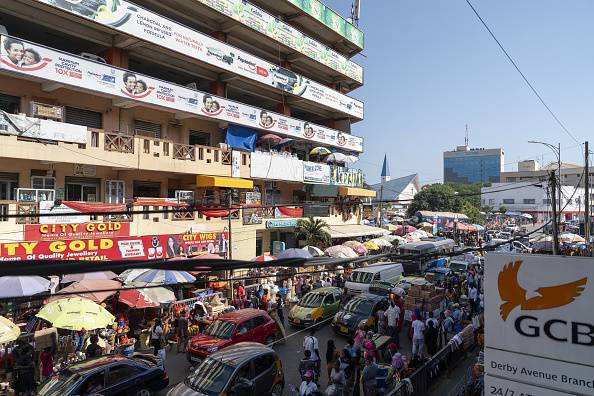

In the energy industry, the cheapest, dirtiest petrol is referred to as “African quality”. This type of petrol, laced with high levels of toxic substances, is banned in Europe.
But major international oil traders, including Trafigura and Vitol, continue to sell the dirty fuel to West African countries, despite the proven risks to human health and the environment.
In doing so, they are bypassing efforts designed to improve the air quality of West African cities, according to a months-long investigation by The Continent, conducted in partnership with investigative journalism platforms Apache and Spit (in Belgium and the Netherlands respectively).
Low-quality petrol and diesel are a major problem for air quality in West Africa.
These dirty fuels contain sulphur and benzene, which can cause cancer, as well as manganese, which damages engine parts, particulate filters and catalytic converters.
The potential health hazard is severe: in 2016, the Swiss NGO Public Eye estimated that a ban on high-sulphur fuels could prevent tens of thousands of premature deaths.
The problem is so common that car mechanics in Accra, for example, regularly text warnings to their customers: “Be careful people! There is bad fuel in the pump again.”
The European Union has tightened its standards for sulphur in petrol in recent decades, allowing just 10 parts per million. But the regulations in most of Africa are much less stringent.
The Economic Community of West African States allows up to five times as much sulphur, although not all member states abide by this rule. Nigeria still allows up to 15 times as much.

Large oil traders, often based in Switzerland, but operating worldwide – such as Trafigura and Vitol – have turned this into a revenue model. They mix fuels with much more sulphur, benzene and manganese than is permitted in Europe, and sell it on to African customers.
These fuels are much cheaper, because it is expensive to remove sulphur from petrol.
The Netherlands and Belgium form an important hub in that trade. Amsterdam, Rotterdam and Antwerp are a hotspot for blending petrol. In the past five years, more than half of all petrol imported by West African countries came from the Netherlands and Belgium – and much of this would have been illegal in Europe.
This changed last year, when the Netherlands introduced tough new restrictions on exporting dirty fuel.
The measure was designed to protect air quality in African cities. Since April, companies have not been allowed to export fuels with more than 50ppm sulphur or too much benzene or manganese from the Netherlands to West Africa.
“You as a producer are responsible for better standards, and therefore no longer allowed to export products you know – or should suspect – are harmful,” said Mariëtta Harjono, a fuel specialist at the Dutch government agency responsible for implementing the new law.
“That is new for the major oil traders. But trading as they were used to is no longer possible.”
Harjono said the major Swiss traders attempted to evade the new rule by relying on an anti-espionage clause in Swiss law, which prohibits them from sharing fuel composition with foreign state agencies.
“Some big oil traders needed some pressure,” said Harjono, with a smile.
“We have had administrative discussions and threatened with penalty payments. They now adhere to the rules and we have a good overview of what is exported from the Netherlands.”
The new regulation appears to be having an impact.
An analysis of fuel trading figures shows that exports from the Netherlands to West Africa have dropped from 24.2-million litres per day to just 7.8-million since it was introduced.
But dirty fuels are still getting into West African petrol stations.
“This is not a problem that the Netherlands can solve alone,” said Bright Simmons, vice-president of the Accra-based think tank Imani-Africa.
“The traders are in Switzerland. The Netherlands is nothing more than a transit port.”
Tank storage companies in the Netherlands, whose businesses have been hit hard by the new regulation, agree.
“The demand for these cheap fuels in West Africa remains. If we don’t supply them, someone else will,” argued the lawyer of two tank storage companies.
Sure enough, traders appear to have already moved their operations to places with less restrictive regulations. The Belgian port of Antwerp has dramatically increased its share of fuel exports to West Africa.
Simmons argues a better solution would be for an EU-wide export ban on dirty fuels, but even then, traders could just move their operations even further afield, to ports in the Middle East or Asia.
In response to questions from the investigative consortium, both Vitol and Trafigura – the world’s first- and second largest oil traders respectively – said that they fully comply with all applicable regulations.
“Only West African countries themselves can set requirements for fuels,” said Vitol.
“Importers will buy the most competitively priced product that meets those local requirements, regardless of which country the fuel comes from.”
In other words: Vitol will continue to sell dirty fuels to West African countries, until those countries tell them not to.
Harjono, the Dutch fuel specialist, has another solution. “It is of course much better if crude oil from West Africa can also be refined on-site, instead of having to ship it halfway across the world twice.”
This research was carried out with the support of the European Journalism Fund. Additional reporting by Louis Goddard and Datadesk.
This article first appeared in The Continent, the pan-African weekly newspaper produced in partnership with the Mail & Guardian, and is designed to be read and shared on WhatsApp. Download your free copy here / at thecontinent.org
European ports are being used as trading hubs for fuel that is too dirty – and dangerous – to be sold in the EU. No prizes for guessing where it ends up instead



